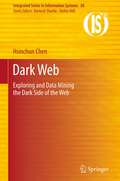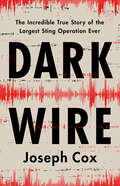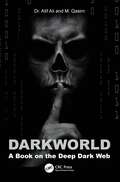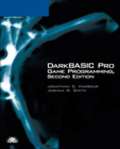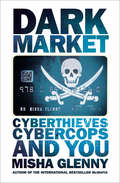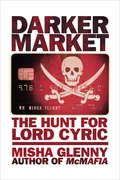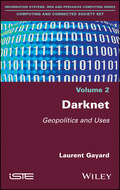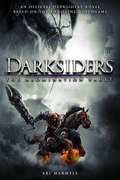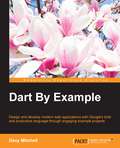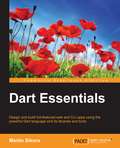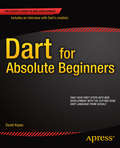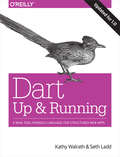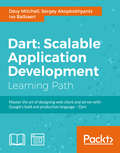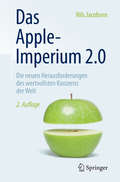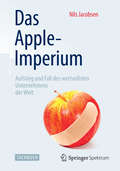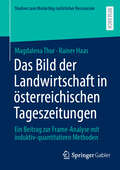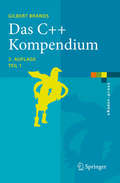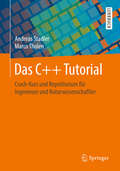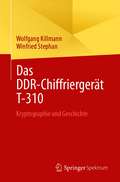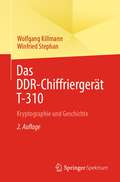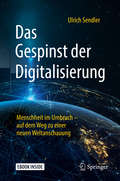- Table View
- List View
Dark Web: Exploring and Data Mining the Dark Side of the Web (Integrated Series in Information Systems #30)
by Hsinchun ChenThe University of Arizona Artificial Intelligence Lab (AI Lab) Dark Web project is a long-term scientific research program that aims to study and understand the international terrorism (Jihadist) phenomena via a computational, data-centric approach. We aim to collect "ALL" web content generated by international terrorist groups, including web sites, forums, chat rooms, blogs, social networking sites, videos, virtual world, etc. We have developed various multilingual data mining, text mining, and web mining techniques to perform link analysis, content analysis, web metrics (technical sophistication) analysis, sentiment analysis, authorship analysis, and video analysis in our research. The approaches and methods developed in this project contribute to advancing the field of Intelligence and Security Informatics (ISI). Such advances will help related stakeholders to perform terrorism research and facilitate international security and peace. This monograph aims to provide an overview of the Dark Web landscape, suggest a systematic, computational approach to understanding the problems, and illustrate with selected techniques, methods, and case studies developed by the University of Arizona AI Lab Dark Web team members. This work aims to provide an interdisciplinary and understandable monograph about Dark Web research along three dimensions: methodological issues in Dark Web research; database and computational techniques to support information collection and data mining; and legal, social, privacy, and data confidentiality challenges and approaches. It will bring useful knowledge to scientists, security professionals, counterterrorism experts, and policy makers. The monograph can also serve as a reference material or textbook in graduate level courses related to information security, information policy, information assurance, information systems, terrorism, and public policy.
Dark Wire: The Incredible True Story of the Largest Sting Operation Ever
by Joseph CoxThe inside story of the largest law-enforcement sting operation ever, in which the FBI made its own tech start-up to wiretap the world, shows how cunning both the authorities and drug traffickers have become, with privacy implications for everyone. In 2018, a powerful app for secure communications called Anom took root among organized criminals. They believed Anom allowed them to conduct business in the shadows. Except for one thing: it was secretly run by the FBI. Backdoor access to Anom and a series of related investigations granted American, Australian, and European authorities a front-row seat to the underworld. Tens of thousands of criminals worldwide appeared in full view of the same agents they were trying to evade. International smugglers. Money launderers. Hitmen. A sprawling global economy as efficient and interconnected as the legal one. Officers watched drug shipments and murder plots unfold, making arrests without blowing their cover. But, as the FBI started to lose control of Anom, did the agency go too far? A painstakingly investigated exposé, Dark Wire reveals the true scale and stakes of this unprecedented operation through the agents and crooks who were there. This fly-on-the-wall thriller is a caper for our modern world, where no one can be sure who is listening in.
Dark World: A Book on the Deep Dark Web
by Atif Ali Muhammad QasimDiscover the hidden depths of the digital underworld in this comprehensive, interdisciplinary exploration of the dark web. Ideal for security agencies, professionals, counter-terrorism experts, and policymakers alike, this work offers invaluable insights that will enhance understanding and fortify strategies. By shedding particular light on the nuances of the ‘dark market,’ this book provides readers with a detailed understanding of the dark web, encompassing both its sinister underbelly and unexpected potential. This book also uncovers the latest trends and cutting-edge mitigation techniques. From illicit transactions to thriving business ventures, it examines the key domains and sectors that thrive within this clandestine environment. This book consolidates myriad perspectives on security and threats on the dark web.
DarkBasic Pro Game Programming (2nd edition)
by Jonathan S. Harbour Joshua R. SmithLearn to write 2D and 3D games without any programming experience by harnessing the advanced 2D/3D graphics features of Dark BASIC Professional! A book for complete beginners who want to learn to write games!
DarkMarket: CyberThieves, CyberCops and You
by Misha GlennyShortlisted for the Orwell Prize and the CWA Gold Dagger for Non-Fiction Award The benefits of living in a digital, globalised society are enormous; so too are the dangers. The world has become a law enforcer's nightmare and every criminal's dream. We bank online, shop online, date, learn, work and live online. But have the institutions that keep us safe on the streets learned to protect us in the burgeoning digital world? Have we become complacent about our personal security -- sharing our thoughts, beliefs and the details of our daily lives with anyone who cares to relieve us of them? In this fascinating and compelling book, Misha Glenny, author of the international bestseller McMafia, explores the three fundamental threats facing us in the twenty-first century: cyber crime, cyber warfare and cyber industrial espionage. Governments and the private sector are losing billions of dollars each year, fighting an ever-morphing, often invisible, and highly intelligent new breed of criminal: the hacker. Glenny has travelled and trawled the world. And by exploring the rise and fall of the criminal website, DarkMarket, he has uncovered the most vivid, alarming and illuminating stories. Whether JiLsi or Matrix, Iceman, Master Splynter or Lord Cyric; whether Detective Sergeant Chris Dawson in Bolton or Agent Keith Mularski in Pittsburgh, Glenny has tracked down and interviewed all the players -- the criminals, the geeks, the police, the security experts and the victims -- and he places everyone and everything in a rich brew of politics, economics and history. The result is simply unputdownable. DarkMarket is authoritative and completely engrossing. It's a must-read for everyone who uses a computer: the essential crime book for our times.
DarkerMarket: The Hunt for Lord Cyric
by Misha GlennyDarkerMarket, the special e-book extra that is the perfect companion to Misha Glenny's DarkMarket, follows the trail of Lord Cyric, the elusive cyber criminal suspected to be living in Canada. In doing so, Glenny unveils some of his investigative methods, explores new lines of inquiry and tries to untangle the web at the black heart of the Internet. This e-book extra delves further into the most compelling crime story of the year. For the full version, as well as further details on cyber criminals and how to protect yourself, read DarkMarket: CyberThieves, CyberCops and You.
Darknet: Geopolitics and Uses
by Laurent GayardThis collaborative research project allows for fundamental advances not only in the understanding of the phenomena but also in the development of practical calculation methods that can be used by engineers. This collaborative research project allows for fundamental advances not only in the understanding of the phenomena but also in the development of practical calculation methods that can be used by engineers.
Darksiders: The Abomination Vault
by Ari MarmellRide with the Horsemen of the Apocalypse as they seek to unearth a plot that could plunge all of Creation into chaos! Ages before the events of Darksiders and Darksiders II, two of the feared Horsemen--Death and War--are tasked with stopping a group of renegades from locating the Abomination Vault: a hoard containing weapons of ultimate power and malice, capable of bringing an end to the uneasy truce between Heaven and Hell . . . but only by unleashing total destruction. Created in close collaboration with the Darksiders II teams at Vigil and THQ, Darksiders: The Abomination Vault gives an exciting look at the history and world of the Horsemen, shining a new light on the unbreakable bond between War and Death.
Dart By Example
by Davy MitchellDesign and develop modern web applications with Google's bold and productive language through engaging example projects About This Book * Full of engaging and varied example projects to equip you to build your own web applications * Learn the Dart language and key libraries * Productively create fast and reliable web applications Who This Book Is For If you are a front- or back-end web developer who is looking to build complex full-featured web applications without the quagmire of disconnected JavaScript frameworks, this book is a practical walkthrough of substantial applications that will have you and your team coding Dart in a productive manner. This book will give you a compiled, optional typed, scalable environment to rapidly develop applications. As Dart was designed to be familiar, any developer with even a small amount of knowledge of JavaScript or another programming language will be at home with the language immediately and will be coding quickly. What You Will Learn * Master the core Dart language, type system, and key development tools * Connect to existing web services, process JSON, and create your own framework for the data display * Run and debug the Dart server and web applications and compile them in JavaScript * Handle form data and encryption * Build and deploy server applications on the major OSes and implement the REST API * Work with PostgreSQL--an industry standard relational database system * Create robust applications with unit tests, documentation, and diagnostic logging * Develop command-line applications, and explore the key data structures and libraries In Detail Designed to create next generation apps, Google's Dart offers a much more robust framework and also supersedes JavaScript in several aspects. Familiar yet innovative, compact yet scalable, it blows away the accumulated JavaScript legacy limitations. Dart was designed for great tool-ability and developer productivity, allowing you to create better application faster than before. Google chose it for their billion dollar advertising business and you have its power for your projects too. This book will introduce you the Dart language starting from its conception to its current form, and where it headed is through engaging substantial practical projects. You will be taken through building typical applications and exploring the exciting new technologies of HTML5. With example code projects such as a live data monitoring and viewing system, a blogging system, a slides presentation application, and more, then this book will walk you through step by step through building data-driven web applications with ease and speed. Style and approach A varied collection of compelling practical Dart projects that are developed progressively with full explanations of concepts and implementation. Each project introduces features of the language and environment, demonstrating how Dart can be used in rich structured web applications.
Dart Cookbook
by Ivo BalbaertIf you are a Dart developer looking to sharpen your skills, and get insight and tips on how to put that knowledge into practice, then this book is for you. You should also have a basic knowledge of HTML, and how web applications with browser clients and servers work, in order to build dynamic Dart applications.
Dart Essentials
by Martin SikoraThis book is targeted at expert programmers in JavaScript who want to learn Dart quickly. Some previous experience with OOP programming in other languages and a good knowledge of JavaScript are assumed.
Dart for Absolute Beginners
by David KopecDart for Absolute Beginners enables individuals with no background in programming to create their own web apps while learning the fundamentals of software development in a cutting edge language. Easily digested chapters, while comprehensive enough to explore the whole domain, are aimed at both hobbyists and professionals alike. The reader will not only gain an insight into Dart, but also the technologies behind the web. A firm foundation is laid for further programming studies. Dart is a new, innovative language developed by Google which is poised to take the web by storm. For client side web app development, Dart has many advantages over JavaScript. These include but are not limited to: improved speed, enforcement of programmatic structure, and improved facilities for software reuse. Best of all, Dart is automatically converted to JavaScript so that it works with all web browsers. Dart is a fresh start, without the baggage of the last two decades of the web. Why start learning to program with yesterday's technology? Teaches you the fundamentals of programming and the technologies behind the web. Utilizes the cutting edge, easy to learn, structured Dart programming language so that your first steps are pointed towards the future of web development. No prior knowledge is required to begin developing your own web apps. What you'll learn Become proficient in the fundamentals of programming. Learn how the technologies behind the web work. Use Dart to write small to medium size web apps. Understand enough HTML and CSS to create your own designs. Be capable of interpreting others' code. Develop a foundation that enables you to further advance your programming skills. Who this book is for Dart for Absolute Beginners is for readers with no prior knowledge of programming (or even HTML) who are interested in taking their first steps into web development with the "latest and greatest" web programming language, Dart. Hobbyists will appreciate its easy-to-digest content, while its focus on the cutting edge Dart language will appeal to professionals. It's also for the reader who simply has a curiosity about how the web and/or programming works - he will gain insight into its technologies without getting into the tiresome emphasis on semantics in some introductory texts. Dart for Absolute Beginners is a thoroughly approachable text for new programmers of all backgrounds. Table of Contents Getting Set Up Your First Dart Programs Some Programming Fundamentals Five Small Programs to Showcase Fundamentals in Dart Functions Data Structures How Does the Web Work? Using Dart to Interact with HTML Hangman Object-Oriented Programming Fundamentals Object-Oriented Design Advanced Dart Concepts Testing Your Work Concurrency Tools of the Trade Putting it All Together Where to Go from Here Interview with Dart's Creators Appendix A: Dart Cheat Sheet Appendix B: History of Web Programming Appendix C: Dart Timeline Appendix D: Great Resources
Dart in Action
by Chris BuckettSummaryDart in Action introduces Google's Dart language and provides techniques and examples showing how to use it as a viable replacement for Java and JavaScript in browser-based desktop and mobile applications. It begins with a rapid overview of Dart language and tools, including features like interacting with the browser, optional typing, classes, libraries, and concurrency with isolates. After you master the core concepts, you'll move on to running Dart on the server and creating single page HTML5 web applications.About the TechnologyDart is a web programming language developed by Google. It has modern OO features, just like Java or C#, while keeping JavaScript's dynamic and functional characteristics. Dart applications are "transpiled" to JavaScript, and they run natively in Dart-enabled browsers. With production-quality libraries and tools, Dart operates on both the client and the server for a consistent development process.About this BookDart in Action introduces the Dart language and teaches you to use it in browser-based, desktop, and mobile applications. Not just a language tutorial, this book gets quickly into the nitty-gritty of using Dart. Most questions that pop up while you're reading are answered on the spot! OO newbies will appreciate the gentle pace in the early chapters. Later chapters take a test-first approach and encourage you to try Dart hands-on.To benefit from this book you'll need experience with HTML and JavaScript?a Java or C# background is helpful but not required.Purchase of the print book comes with an offer of a free PDF, ePub, and Kindle eBook from Manning. Also available is all code from the book.What's InsideDart from the ground upNumerous code samples and diagramsCreating single-page web appsTransitioning from Java, C#, or JavaScriptRunning Dart in the browser and on the serverAbout the AuthorChris Buckett builds enterprise-scale web applications. He runs Dartwatch.com and is an active contributor to the dartlang list."Includes numerous examples of core language features as well as more advanced HTML5 features."-;From the Foreword by Seth Ladd, Developer Advocate, GoogleTable of ContentsPART 1 INTRODUCING DARTHello Dart"Hello World" with Dart toolsBuilding and testing your own Dart appPART 2 CORE DARTFunctional first-class functions and closuresUnderstanding libraries and privacyConstructing classes and interfacesExtending classes and interfacesCollections of richer classesAsynchronous programming with callbacks and futuresPART 3 CLIENT-SIDE DART APPSBuilding a Dart web appNavigating offline dataCommunicating with other systems and languagesPART 4 SERVER-SIDE DARTServer interaction with files and HTTPSending, syncing, and storing dataConcurrency with isolates
Dart: A New, Tool-Friendly Language for Structured Web Apps
by Kathy Walrath Seth LaddGet moving with Dart, the development platform that helps you build high-performance HTML5 apps for the modern Web. With this guide, you’ll take a hands-on tour of the Dart language, libraries, and tools—including its editor and virtual machine—for developing structured, fast, and maintainable web apps that run on both the client and the server.Written by developer advocates at Google, this updated edition covers Dart 1.0. Google designed Dart to boost performance and help developers work more efficiently. This book shows you how to build everything from simple scripts to complex apps that work well in today’s browsers.Build web apps with the object-oriented Dart language, and compile your code to JavaScriptDelve into language features, from optional types and method cascades to named constructorsCreate, launch, and debug web and command-line apps with Dart EditorExplore Dart APIs, including dart:core, dart:html, dart:io, dart:convert, and dart:mirrorsUse tools such as Dartium, the Chromium-based browser that can run Dart apps nativelyWalk through Dartiverse Search, a client-server app that combines useful and fun language and API features
Dart: Scalable Application Development
by Ivo Balbaert Sergey Akopkokhyants Davy MitchellMaster the art of designing web client and server with Google's bold and productive language – Dart About This Book • Create robust applications with unit tests, documentation, and diagnostic logging • Master the core Dart language, type system, and key development tools • Connect to existing web services, process JSON, and create your own framework for the data display • Use mixins, reflections, annotations, and other metadata programming techniques to create powerful app Who This Book Is For If you are familiar with web development and are looking to learn, or even just evaluate, Dart as a multipurpose language, this learning path is for you. No familiarity with the Dart language is assumed. For beginners, it will serve as a guide to rapidly accelerate from a novice level to the master level; for intermediate to advanced developers it will quickly fill in the gaps on Dart and can explore a range of application types and powerful packages that are demonstrated in a practical manner. What You Will Learn • Handle form data and encryption • Set up your Dart environment to achieve the highest productivity • Run and debug the Dart server and web applications and compile them in JavaScript • Work with PostgreSQL—an industry standard relational database system • Create robust applications with unit tests, documentation, and diagnostic logging • Develop command-line applications, and explore the key data structures and libraries • Detect and use HTML5 features that will help you deliver rich, cross-platform content • Demonstrate the power of Polymer web components for binding data and structuring your web pages In Detail Designed to create next generation apps, Google's Dart offers a much more robust framework and also supersedes JavaScript in several aspects. Familiar yet innovative, compact yet scalable, it blows away the accumulated JavaScript legacy limitations. Dart was designed for great tool-ability and developer productivity, allowing you to create better application faster than before. Google chose it for their billion dollar advertising business and you have its power for your projects too. The first module will introduce you the Dart language starting from its conception to its current form, and where it headed is through engaging substantial practical projects. You will be taken through building typical applications and exploring the exciting new technologies of HTML5. The second module will show you how to add internalization support to your web applications and how i18n and i10n access can be embedded into your code to design applications that can be localized easily. You will be shown how to organize client-to-server communication and how different HTML5 features can be used in Dart. Finally, this module will show you how you can store data locally, break the storage limit, and prevent security issues in your web application. The third module is a pragmatic guide that will increase your expertise in writing all kinds of applications, including web apps, scripts, and server-side apps. It provides rich insights on how to extend your Dart programming skills. Altogether, this course provides you the power to create powerful applications with Dart, without worrying about your knowledge leading to you having to make compromises to the end product! This Learning Path has been curated from three Packt products: • Dart By Example By Davy Mitchell • Mastering Dart By Sergey Akopkokhyants • Dart Cookbook By Ivo Balbaert Style and approach This is an enticing learning path that starts from the very basics to gradually pick up pace as the story unfolds. Each topic is explained with the help of recipes that solves a real-world problem involving hands-on work thus giving you a deep insight into the world of DART.
Das Apple-Imperium 2.0: Die neuen Herausforderungen des wertvollsten Konzerns der Welt
by Nils JacobsenDas Apple-Imperium 2. 0 Apple ist größer, wertvoller und mächtiger als je zuvor. Doch im Zenit der Macht liegt bekanntlich der Keim des Niedergangs. Wie andere Imperien in der Geschichte ist auch Apples scheinbar unangefochtene Regentschaft vom Verfall bedroht. Die Apple Watch, die erste neue Produktkategorie seit fünf Jahren, tut sich schwerer als erwartet. Und wie lange kann das iPhone eigentlich noch sein bemerkenswertes Wachstum fortsetzen? Das ,,Apple-Imperium 2. 0" beleuchtet Apple als Wirtschaftsunternehmen - und das vor allem in der Ära des neuen Regenten Tim Cook. Besichtigen Sie den wertvollsten Konzern der Welt, der sein Königreich mit aller Macht verteidigen will und sich dafür doch ein weiteres Mal neu erfinden muss. Der erfahrene Wirtschaftsjournalist und Apple-Experte Nils Jacobsen erzählt die packende Geschichte des beeindruckendsten Unternehmens unserer Zeit: Das Geheimnis des unglaublichen Apple-Erfolgs - und welchen Herausforderungen sich der Techpionier in Zukunft stellen muss. Der Autor Nils Jacobsen, Jahrgang 1974, ist ausgewiesener Apple-Experte und Wirtschaftsjournalist mit knapp 20-jähriger redaktioneller Erfahrung. Der gebürtige Hanseat verfolgt seit Mitte der 90er Jahre in unzähligen Artikeln Apples erstaunlichen Aufstieg zum wertvollsten Konzern aller Zeiten und die darauffolgenden Turbulenzen der Tim Cook-Ära. Jacobsen berichtet über Apple täglich beim Medienportal MEEDIA, in einer wöchentlichen Kolumne bei Yahoo Finance und zuvor in zahlreichen Artikeln für manager magazin online, SPIEGEL Online, WELT Online, das Hamburger Abendblatt, Mac Life und anderen bekannten Medien und Apple-Magazinen. www. facebook. com/DasAppleImperium
Das Apple-Imperium: Aufstieg und Fall des wertvollsten Unternehmens der Welt
by Nils JacobsenApple war größer, wertvoller und mächtiger als je zuvor. Doch im Zenit der Macht liegt bekanntlich der Keim des Niedergangs. Plötzlich erlebte der Kultkonzern aus Cupertino an der Börse einen beispiellosen Absturz - das jahrzehntelange Wachstum scheint an eine Grenze gestoßen zu sein. Wie andere Imperien in der Geschichte ist auch Apples scheinbar unangefochtene Regentschaft vom Verfall bedroht: Die Herausforderer rund um Googles Android-Betriebssystem, eigene Hybris und die Gesetze der kreativen Zerstörung könnten Apples Reich ins Wanken bringen. Vor allem scheint fraglich, ob CEO Tim Cook dem schweren Erbe Steve Jobs gewachsen ist und ob Apple auch ohne seinen ikonischen Gründer weiter für bahnbrechende Innovationen sorgen kann. Der erfahrene Wirtschaftsjournalist und Apple-Experte Nils Jacobsen erzählt die packende Geschichte des beeindruckendsten Unternehmens unserer Zeit: Das Geheimnis des unglaublichen Apple-Erfolgs - und wovon er in den nächsten Jahren bedroht werden könnte.
Das Bild der Landwirtschaft in österreichischen Tageszeitungen: Ein Beitrag zur Frame-Analyse mit induktiv-quantitativen Methoden (Studien zum Marketing natürlicher Ressourcen)
by Rainer Haas Magdalena Thur„Wenn Agrarriesen die Landidylle überrollen, erheben sich Ökorebellen gegen die Ernährungsindustrie.&“ Sprachbilder wie diese – auch Frames genannt – prägen die Wahrnehmung der Landwirtschaft, da sie einen Deutungsrahmen vorgeben.Dieses Buch analysiert mediale Darstellungen der Landwirtschaft am Beispiel von Zeitungsartikeln. Als methodischer Beitrag zur Frame-Analyse vergleicht es gängige Methoden, zeigt die Umsetzung einer induktiv-quantitativen Studie auf und nennt Anwendungshinweise für die weiterführende Forschung. Die Ergebnisse und neuen Hypothesen zu Medienframes im österreichischen Journalismus werden wissenschaftlich kontextualisiert und diskutiert. Eine Anregung zur kritischen Reflexion über die Qualität und Pluralität medialer Berichterstattung.
Das Buch zu E-Books
by Andy Artmann Florian RudtSie fragen sich, ob E-Books etwas für Sie sind? Sie wollen einen E-Reader anschaffen? Sie möchten Ihr iPad oder Ihren Tablet PC zum Lesen nutzen? Sie fragen sich, wo Sie digitalen Lesestoff kaufen oder E-Books sogar kostenlos bekommen können? Sie möchten verstehen, was EPUBs von PDFs unterscheidet? Das Buch zu E-Books bietet einen Einstieg in die Welt der digitalen Bücher. Machen Sie sich ein Bild über die Vor- und Nachteile, die neuen Möglichkeiten und Einschränkungen des digitalen Lesens. Die Autoren -- seit vielen Jahren in der Welt der Bücher und inzwischen auch der E-Books zuhause -- unterstützen Sie mit praktischen Anleitungen und Tipps bei Ihren ersten Schritten. Sie beantworten zentrale Fragen wie: - Auf welchen Geräten kann ich E-Books lesen und was passt am besten zu meinen Bedürfnissen? - Welche gut sortieren E-Book-Shops gibt es und wo finde ich gemeinfreie E-Books, kostenlos und ganz legal? - Mit welchen Apps bzw. Programmen kann ich meine E-Books lesen und wie benutze ich sie? - Apple und Amazon gelten als geschlossene Welten - was muss ich beachten? - E-Books nicht kaufen, sondern ausleihen - wo und wie geht das? - EPUB oder PDF, Bücher mit und ohne DRM - was bedeutet das praktisch?
Das C++ Kompendium: STL, Objektfabriken, Exceptions (eXamen.press)
by Gilbert BrandsDas Lehrbuch vermittelt die zentralen Konzepte der Programmierung in C++ im Detail. Anhand komplexer Problemstellungen wird gezeigt, wie korrekter und wiederverwendbarer Code entwickelt wird und wie sich mithilfe einer Programmiertechnik typische Fehler vermeiden lassen. Leser werden anhand von Aufgaben schrittweise an Problemstellungen herangeführt. Die mathematische und algorithmische Herangehensweise macht das Buch auch zu einem wertvollen Studienbegleiter für Veranstaltungen wie "Algorithmen und Datenstrukturen" oder "numerische Mathematik".
Das C++ Tutorial: Crash-kurs Und Repetitorium Für Ingenieure Und Naturwissenschaftler
by Andreas Stadler Marco TholenDieses Tutorial hilft nicht nur Ingenieuren und Naturwissenschaftlern beim schnellen Einstieg und der Vertiefung in die Programmierung mit C++. Kommentierte Aufgaben, lebensnahe Beispiele und eine kompakte sowie systematische Struktur zeichnen dieses Buch aus.
Das DDR-Chiffriergerät T-310: Kryptographie und Geschichte
by Wolfgang Killmann Winfried StephanDieses Buch beschreibt, unter welchen Bedingungen das in der DDR am weitesten verbreitete Fernschreibchiffriergerät sowie der dazugehörige Algorithmus vor etwa 50 Jahren zum Schutz von Staatsgeheimnissen entwickelt wurden. Der Leser kann die damaligen Methoden und Ergebnisse mit den aktuellen Möglichkeiten einer kryptologischen Analyse vergleichen – insbesondere unter dem Aspekt der heute zur Verfügung stehenden Computertechnik. Es wird herausgearbeitet, dass die konsequente Anwendung von Methoden der Gruppen- und Automatentheorie in der Analyse eine zentrale Rolle spielte. Dieser algebraische Analyseansatz aus der sowjetischen Schule wird bis heute unterschätzt – die Betrachtungsweisen können auch für Nichtkryptologen unter den Lesern von Nutzen sein. Darüber hinaus werden die Unterschiede dargestellt zwischen der Analyse des Chiffrieralgorithmus, der Sicherheitsanalyse des Geräts und der Chiffrierverfahren, in denen es zum Einsatz kommt. Schließlich wird auch das Ende der T-310 beschrieben, das mit dem Untergang der DDR einhergeht: Das Gerät wurde letztmalig im Vereinigungsprozess auf einer gesicherten Fernschreibverbindung zwischen Bonn und Berlin eingesetzt.Beide Autoren sind studierte Mathematiker und wirkten maßgeblich an der Entwicklung und Analyse der T-310 mit. Hier berichten erstmals Insider über diese Arbeit.
Das DDR-Chiffriergerät T-310: Kryptographie und Geschichte
by Wolfgang Killmann Winfried StephanDieses Buch beschreibt, unter welchen Bedingungen das in der DDR am weitesten verbreitete Fernschreibchiffriergerät sowie der dazugehörige Algorithmus vor etwa 50 Jahren zum Schutz von Staatsgeheimnissen entwickelt wurden. So können die damaligen Methoden und Ergebnisse mit den aktuellen Möglichkeiten der kryptologischen Analyse verglichen werden – insbesondere unter dem Aspekt der heute zur Verfügung stehenden Computertechnik.Es wird herausgearbeitet, dass die konsequente Anwendung von Methoden der Gruppen- und Automatentheorie in der Analyse eine zentrale Rolle spielte. Dieser algebraische Analyseansatz aus der sowjetischen Schule wird bis heute unterschätzt – die Betrachtungsweisen können auch für Nichtkryptologen von Nutzen sein. Darüber hinaus werden die Unterschiede dargestellt zwischen der Analyse des Chiffrieralgorithmus, der Sicherheitsanalyse des Geräts und der Chiffrierverfahren, in denen es zum Einsatz kommt.Die Ergänzungen in der zweiten Auflage beruhen auf Informationen früherer Mitarbeiter und auf Dokumenten aus den 80er Jahren, die erst nach Erscheinen der Erstauflage zugänglich wurden: Auf der Basis von Originaldokumenten wird nun die Historie der T-310-Entwicklung ausgehend vom Vorläuferalgorithmus SKS genauer dargestellt. Außerdem gelang es den Autoren, einige zuvor nicht lösbare Probleme mit der heute zur Verfügung stehenden Computertechnik zu bearbeiten – daran wird deutlich, wie begrenzt die Rechenkapazität in den 70er und 80er Jahren war. Schließlich wird der letzte Einsatz der T-310 zur Realisierung von gesicherten Fernschreibverbindungen zwischen Ministerien der BRD und der DDR rekonstruiert.
Das Gespinst der Digitalisierung: Menschheit im Umbruch – auf dem Weg zu einer neuen Weltanschauung
by Ulrich SendlerÜbernehmen bald die Roboter? Hat die Menschheit noch eine Zukunft? Und was hat das mit der Ausbreitung des Populismus zu tun? Das Buch spannt einen Bogen von der Digitalisierung zu aktuellen gesellschaftspolitischen Umbrüchen. Übersichtlich strukturiert und leicht verständlich geschrieben, hilft das Buch Lesern, das Wesen der digitalen Transformation zu begreifen – unter anderem, indem es Parallelen zur industriellen Revolution aufzeigt. Für seine Analyse verknüpft der Autor die Digitalisierung mit politischen, historischen, wirtschaftlichen, soziologischen und philosophischen Fragestellungen.Nach seiner Analyse gehen die gegenwärtigen Angriffe auf die Demokratie und deren schwache Abwehr in den Industrieländern nicht zufällig mit der Digitalisierung von Wirtschaft und Industrie einher: Sie sind zwei Seiten derselben Medaille. In seinem Rückblick auf die Geschichte zeigt er, auf welche Art und Weise gesellschaftliche Phänomene wie Klassenkampf, Nationenbildung und Demokratisierung mit dem Industriezeitalter verwoben sind. Er beschreibt, wie die Digitalisierung spätestens seit den Siebzigerjahren des 20. Jahrhunderts mit der massenhaften Herstellung von Mikrochips die Welt erobert. Diese Entwicklung ist so weit fortgeschritten, dass mittlerweile fast alle privaten und öffentlichen Bereiche des Lebens von der Digitalisierung geprägt sind. Ulrich Sendler verknüpft seine Schilderung mit politisch-gesellschaftlichen Umbrüchen, von der Revolte der 68er bis zum neoliberalen Gesellschaftsentwurf. Der Begriff Digitalisierung, so seine These, beschreibt den Übergang der Gesellschaft zu etwas Neuem, das durch die Allgegenwart des Digitalen bestimmt sein wird. Und diese Transformation könnte sich, ebenso wenig wie die Industrialisierung, nicht ohne Revolten vollziehen. Das Buch sagt nicht vorher, was auf uns zukommt. Es stellt Zusammenhänge her, hilft aktuelle Entwicklungen zu verstehen und sich eine eigene Meinung zu bilden. Ulrich Sendler, seit mehr als drei Jahrzehnten als Fachjournalist, Technologieanalyst und Autor rund um die Digitalisierung der Industrie tätig, will eine Debatte über das anbrechende digitale Zeitalter anstoßen. Damit richtet sich das Buch nicht nur an Politiker, Wissenschaftler und Praktiker, sondern insbesondere an interessierte Bürger.
Das Google+ Buch
by Annette SchwindtVon vielen sehnsüchtig erwartet: Die übersichtliche und umfassende Anleitung zu Google+ von der Autorin des Bestsellers "Das Facebook-Buch", Annette Schwindt. Google+ ist so schnell durchgestartet wie keine andere Social Media-Plattform zuvor. Immer mehr Menschen tummeln sich in dem noch jungen sozialen Netzwerk und können dabei immer mehr von der Integration zentraler Google-Dienste wie der Suche profitieren. Wie das geht, erklärt Annette Schwindt ebenso wie die Einrichtung des Profils, die richtigen Privatsphäreeinstellungen, Google+-spezifische Aktivitäten wie Hang-outs und vieles mehr.
